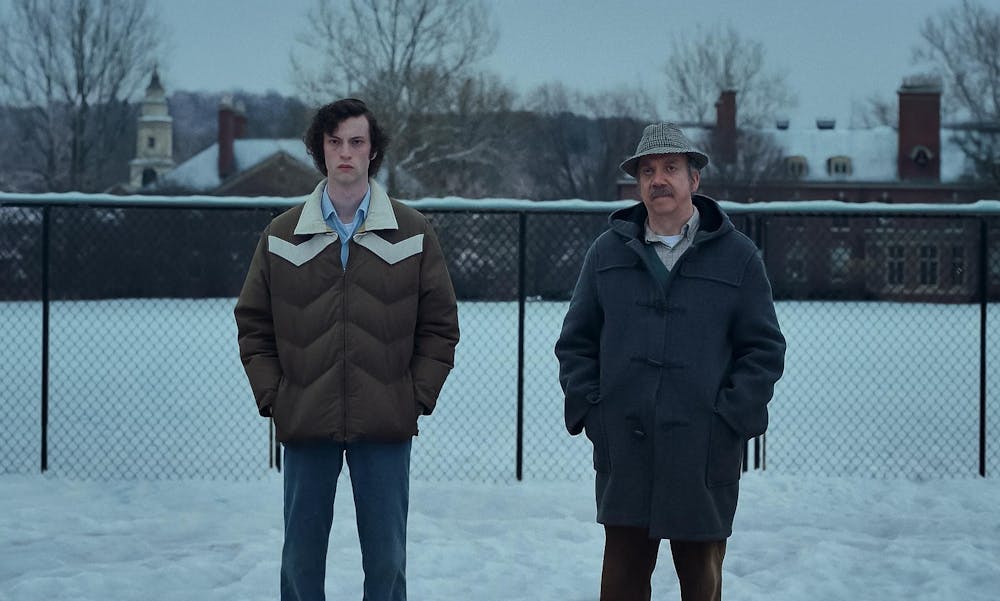Discomfort and joy serve as the basis for “The Holdovers,” Alexander Payne’s Oscar-nominated dramedy. Replicating the look of 1970s film stock, the cozy intimacy of this nostalgic stylization reflects both the beauty and forced introspection of Northeast winters. The film explores grief, loss, regret and loneliness while maintaining the Christmas season’s magical undertone.
Paul Hunham (Paul Giamatti) is a classics professor at Barton Academy, a private boarding school that he once attended. Grumpy, stubborn and despised, Hunham is forced to oversee the five students left on campus over winter break. While four of them are able to escape on a ski trip — courtesy of a wealthy parent — Angus Tully (Dominic Sessa) is unable to reach his parents for permission, leaving him marooned alongside Hunham and Mary Lamb (Da’Vine Joy Randolph), the compassionate cafeteria manager grappling with the recent loss of her son.
The confluence of this unlikely trio brings out the hidden depths in each of their characters. Through a simple premise, the natural dialogue and often humorous tension between Hunham and Tully’s stubbornness bring a refreshing take on coping with loneliness. In the space between the pain, the film portrays comfort and healing through shared emotion.
When Tully, Hunham and Lamb take a trip to Boston, they step outside the familiar confines of Barton Academy and into the “real world,” allowing the viewer to see snippets of the characters’ selves and backgrounds that the monotony of the campus had stifled. From meeting Tully’s father — who resides in a psychiatric hospital — to learning that Hunham was expelled from Harvard, the film’s narrative had the potential to fall into depressing self-pity. Instead, its focus on the transformation from Tully and Hunham’s tense dynamic to a father-son-like bond conveys warmth through empathy.
Christmas movies are typically filled to the brim with unexpected love and fervent holiday cheer. At first glance, teeming with obstinate characters that seem stuck in sorrowful isolation, “The Holdovers” seems to lie far from the tropes of a holiday classic: it is painfully relatable and realistic about situational remorse.
But cheer is found in the small moments when Hunham, Tully and Lamb start to look out for each other. When they share gifts, celebrate the new year and grow to understand and care about the others’ struggles, “The Holdovers” offers unexpected love in unexpected places a new meaning, depicting friendships and father figures as avenues for healing and companionship.
Even more unique is the simultaneous permanence and temporality in the bonds formed. The Christmas season never lasts forever, and neither can the circumstantial trio formed by necessity. The viewer is aware of this impermanence throughout the film — one that reflects the discomfort characters feel both in their own lives and their current environment.
But that impermanence also enables the viewer to immerse themselves fully in the fleeting joys and memories the characters experience — to take advantage of every moment of peace and love that arises.
Though Hunham, Tully and Lamb are not meant to remain physically present together — and Hunham is fired after taking full responsibility for Tully’s visit to the psychiatric hospital — there is permanence in how their bonds allow them to move forward with their lives: past Hunham’s regret, Tully’s loneliness and Lamb’s grief.
It is easy to appreciate a film that capably ties nostalgic tenderness with relatable healing. As the award season powers on and the Oscars inch closer, “The Holdovers” stands out by transforming a predefined genre into a tender, thought-provoking piece.





